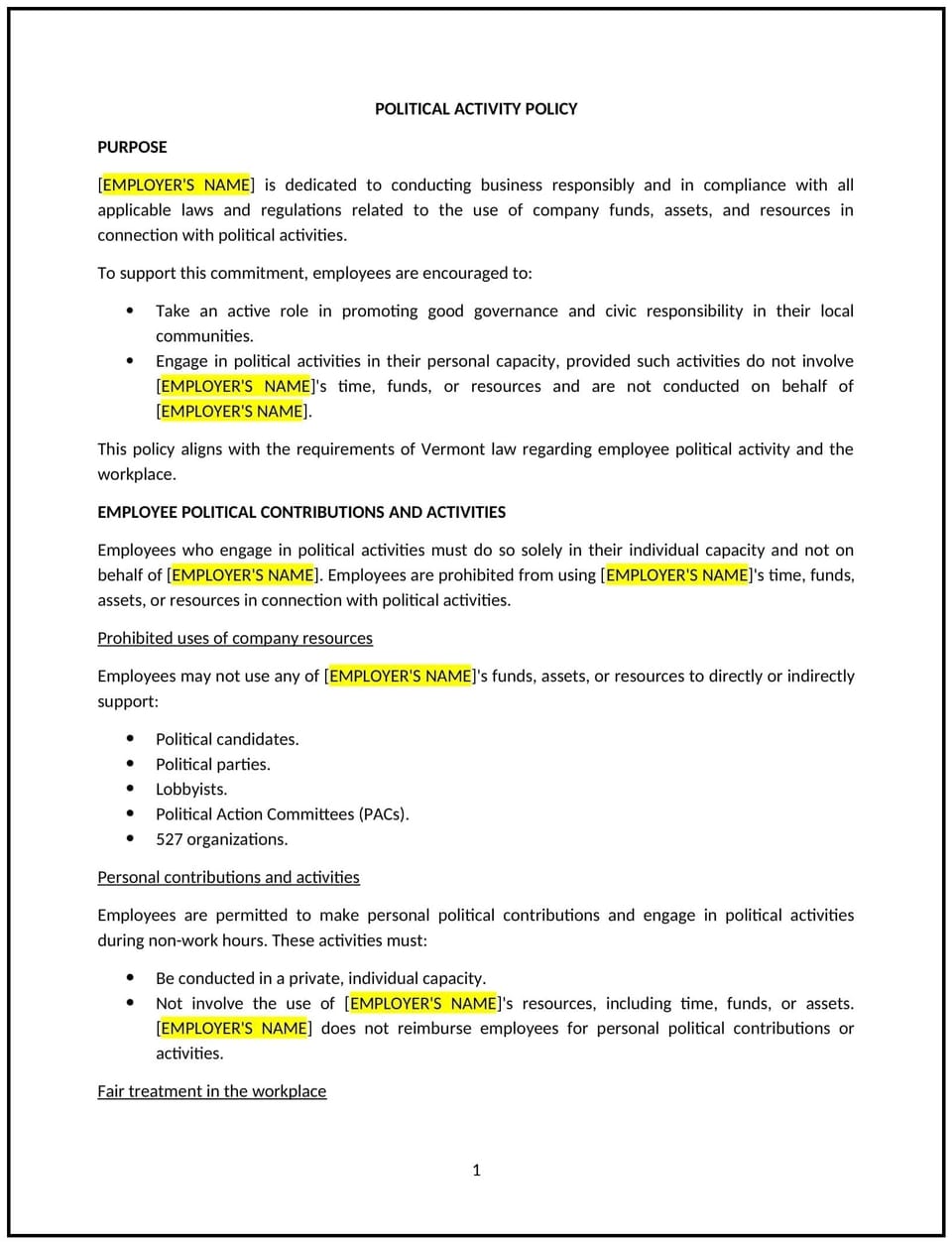Political activity policy (Vermont): Free template

Political activity policy (Vermont)
This political activity policy is designed to help Vermont businesses manage employee participation in political activities while maintaining workplace neutrality and compliance with state and federal laws. It provides guidelines for balancing employee rights with the organization’s need to avoid conflicts of interest or disruptions.
By adopting this policy, businesses can support employee civic engagement while protecting workplace productivity and impartiality.
How to use this political activity policy (Vermont)
- Define acceptable activities: Specify permissible political activities employees can engage in during non-work hours and without using company resources.
- Address workplace neutrality: Reinforce that the workplace should remain neutral and free from partisan activity, including campaigning or displaying political materials.
- Include time-off guidelines: Outline how employees can request time off for voting, campaigning, or other political obligations, in line with Vermont laws.
- Prohibit resource use: Prohibit the use of company resources, such as email, meeting spaces, or supplies, for political purposes.
- Emphasize non-discrimination: Ensure that employees are not discriminated against based on their political beliefs or lawful political activities.
- Establish reporting procedures: Provide steps for reporting concerns about political activity that violates this policy.
- Monitor compliance: Regularly review practices to ensure alignment with Vermont laws and workplace standards.
Benefits of using this political activity policy (Vermont)
This policy provides several benefits for Vermont businesses:
- Supports employee rights: Balances employees’ rights to participate in political activities with workplace policies.
- Maintains neutrality: Ensures the workplace remains impartial and focused on business objectives.
- Promotes compliance: Aligns with Vermont laws and federal regulations regarding political activity and workplace rights.
- Reduces conflicts: Minimizes workplace disputes related to political differences.
- Enhances trust: Demonstrates the company’s commitment to fairness and respect for diverse viewpoints.
Tips for using this political activity policy (Vermont)
- Communicate the policy: Share the policy with employees during onboarding and include it in the employee handbook or internal systems.
- Train managers: Educate managers on balancing workplace neutrality with employees’ rights to political expression.
- Document time-off requests: Maintain records of employee requests for political-related leave, such as time off for voting or campaigning.
- Encourage respectful dialogue: Foster a workplace culture that values respectful discussions and discourages divisive political behavior.
- Update regularly: Revise the policy to reflect changes in Vermont laws, workplace dynamics, or political activity trends.
Q: Can employees engage in political activities during work hours?
A: No, employees should conduct political activities during non-work hours and outside the workplace to maintain productivity and neutrality.
Q: Are employees allowed to use company resources for political purposes?
A: No, employees are prohibited from using company resources, such as email, meeting spaces, or supplies, for political purposes.
Q: How should businesses handle time-off requests for political activities?
A: Time-off requests for political activities, such as voting or campaigning, should follow the company’s leave procedures and comply with Vermont laws.
Q: Can employees discuss political topics at work?
A: While casual political discussions are not prohibited, employees should ensure conversations are respectful and do not disrupt the workplace or make others uncomfortable.
Q: How does this policy address workplace neutrality?
A: The policy prohibits campaigning, displaying political materials, or engaging in partisan activities in the workplace to maintain neutrality.
Q: What steps can businesses take if political activity disrupts the workplace?
A: Businesses should address disruptions by reinforcing the policy, discussing concerns with involved employees, and taking corrective action if necessary.
Q: How often should this policy be reviewed?
A: This policy should be reviewed annually or whenever significant changes occur in Vermont laws or workplace practices.
Q: Does this policy restrict employees’ rights to political expression?
A: No, this policy supports employees’ rights to political expression outside of work while maintaining workplace neutrality and compliance with the law.
This article contains general legal information and does not contain legal advice. Cobrief is not a law firm or a substitute for an attorney or law firm. The law is complex and changes often. For legal advice, please ask a lawyer.


